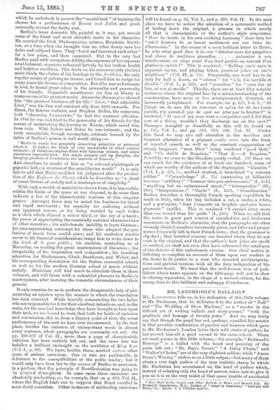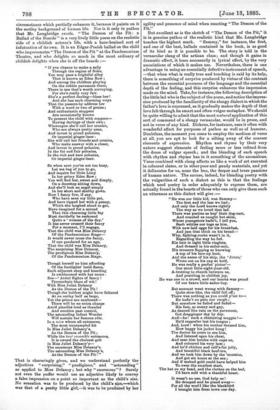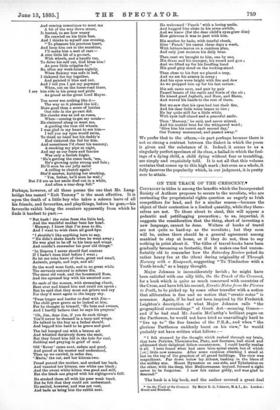MR. LANGBRIDGE'S BALLADS.*
Mn. LANGBRIDGE tells us, in his dedication of this little volume to Mr. Buchanan, that he dedicates it to the author of "Nell" and " The Wedding of Shon Maclean," as a " master in the difficult art of writing ballads and story-poems," "with the gratitude and homage of twenty years." And we may fairly say that though the pupil has not, perhaps, equalled his master in that peculiar combination of passion and humour which gave to Mr. Buchanan's London lyrics their wild strain of pathos, be has proved himself a good second in the same school. There are weak poems in this little volume,—for example, " Redwood'sRevenge " is a ballad with the heart and meaning of the poem left oat ; " Dr. Dan's Secret," " A Daisy Chain," and " Walter's Choice," are of the very slightest calibre; while "Amos. Dnnn's Wooing" strikes ns as a little vulgar,—but many of them attain a very high pathos of the true realistic stamp to which. Mr. Buchanan has accustomed us, the kind of pathos which,. instead of exhaling only the heart of sorrow, takes care to give it you as it is in the very midst of that queer jumble of accidental
circumstance which partially enhances it, because it paints on it the motley background of human life. Nor is it only in pathos that Mr. Langbridge excels. " The Demon of the Pit : a Ballad of the Boards " is a very lively little poem on the realistic side of a childish actress's life, with a hare-brained sort of infatuation of its own. It is an Edgar-Poeish ballad on the child who impersonates " The Demon of the Pit " at the Pandemonium Theatre, and who delights so much in the most ordinary of childish delights when she is off the boards :
" If you chance to make a sally
Through the region of Soho, You may pass a frightful alley That is known as Eden Row ; And among the children playing
On the cobble pavement there, There is one that's worth surveying,
For she's really very fair.
She's a perfect darling—bless her !
And she has such charming ways That the passers-by address her With a word or two of praise ; And enthusiastic stoppers Are occasionally known
To present the child with coppers—
Having darlings of their own ; Whereupon she'll call her cronies, Who are always pretty near, And invest in proud polonies, Or imperial ginger-beer :
She will call her friends and cronies,
Who make answer with a cheer, And invest in proud polonies, In the fat and fair polonies, In the rich and rare polonies, Or imperial ginger-beer.
So when next you're not too busy,
Let me beg of you to go, And inquire for little Lizzy In her grimy Eden Row ; You will find her, sweet and dimply, On a doorstep Bitting down, And she'll look an angel simply In her short and shabby gown.
Now I fancy few, if any, Who have seen my little pet,
And have tipped her with a penny,
Which she laughed aloud to get, Have imagined for a second That this charming little fay Must decidedly be reckoned Quite a woman of the day.'
It has never crossed their fancy
For a moment, I'll engage,
That the child was Miss Delaney
Of the Pandemonium Stage—
It would never cross the fancy, If one pondered for an age, That the child was Miss Delaney, The surprising Miss Delaney,
The prodigious Miss Delaney,'
Of the Pandemonium Stage.
Though herself no hint affording Of the footlights' lurid flame, Each adjacent shop and hoarding Is emblazoned with her name .
See—' Aerial flights of fancy !
Pyrotechnic blaze of wit !
With Miss Juliet Delaney As the Demon of the Pit !
Though the boldest might have faltered At an outlay half as large,
Yet the prices are unaltered—
There will be no extra charge Amid plaudits loud as thunder And emotion past control, The astounding Infant Wonder Will sustain her famous role.
In a wise where all entrances,
The most unexampled hit
Is Miss Juliet Delaney's,
As the Demon of the Pit;
While the tout ensemble entrances,
It is owned the choicest grit Is Miss Juliet Delaney's The enormous Miss Delaney's, The astounding Miss Delaney's, As the Demon of the Fit! "
That is charmingly given, and we understand perfectly the adjectives " surprising," "prodigious," and " astounding " as applied to Miss Delaney ; but why " enormous " ? Sarely not even the puffer would use an adjective likely to convey a false impression on a point so important as the child's size. No sensation was to be produced by the child's size,—which was that of a pretty little girl,—it was to be produced by her agility and presence of mind when enacting " The Demon of the Pit."
But excellent as is the sketch of "The Demon of the Pit," it is in genuine pathos of the realistic kind that Mr. Langbridge touches the highest mark. " Sammy," for instance, the first, and one of the best, ballads contained in the book, is as good of its kind as it is possible to be. The story is told in the vernacular slang of the artisan class ; and though it gains in dramatic effect, it loses necessarily in lyrical effect, by the very associations of which it makes use. Nevertheless, there is one advantage in using an essentially defective instrument of speech, —that when what is really true and touching is said by its help, there is something of surprise produced by virtue of the contrast between the essential poorness of the language and the essential depth of the feeling, and this surprise enhances the impression made on the mind. Take, for instance, the following description of the little lad who is the subject of the poem, and notice the impression produced by the familiarity of the slangy dialect in which the father's love is expressed, as it gradually makes the depth of that love felt through its smart and often vulgar metaphor. We should be quite willing to admit that the most natural application of this sort of command of a slangy vernacular, would be in prose, and not in verse of any kind. Dickens, for instance, uses it often with wonderful effect for purposes of pathos as well as of humour. Doubtless, the moment you come to employ the medium of verse at all, you are apt to look for a sifting away of the coarser elements of expression. Rhythm and rhyme by their very nature suggest elements of feeling more or less refined from the dross of vulgar speech ; and the blending of such speech with rhythm and rhyme has in it something of the anomalous. Verse combined with slang affects us like a work of art executed in coloured slates, or in other poor and gaudy materials, and yet it delineates for us, none the less, the deeper and truer passions of human nature. The excuse, indeed, for blending poetry with the vulgarities of such a dialect as this is that the feelings which need poetry in order adequately to express them, are actually found in the hearts of those who can only give them such an utterance as this dialect will give :— " He was our little kid, was Sammy—
The first and the last we had ; And only the Lord knows rightly The way as we loved that lad.
There was parties as kep' their dog-cart, And counted us naught but skim, Whose youngsters hadn't, I tell you, Such wittles nor togs as him.
With new-laid eggs for his breakfast, And jam that thick on his bread—
Why, fighting-cocks wasn't in it, Regarding the way he fed.
His hair in tight little ringlets, And dressed in his sailor-suit,
His trousers flapping BO knowing
A-top of his lace-up boot, And the name of his ship, the Wrote out on his cap so bold, He was really a perfee' plant"— Our stoat little eight-year-old.
A-trotting to church between us, And prattling in childish joy, He was one in a crowd, and our hearts was proud Of our brave little sailor-boy.
But summat went wrong with Sammy—
Quite slow-like, the child fell off;
There was nothing as you could p'int to—
He hadn't no pain nor cough;
But somehow he failed and faded—
His feet, so merry and gay, As danced like rain on the pavement, Got dragginger day by day.
And—he! such a chattering magpie!—
He'd reggerler lost his tongue ; And, Lord ! when his mother dressed him, How baggy his jacket hung !
The doctor he come to see him, And listened agen his chest, And sent him bottles with caps on, And coloured his very best ; And he'd chicken and calf e-fut jelly, And beautiful black beef-tea, And we took him down by the 'scursion, And got six hours at the sea ; And if melted gold could have helped him To even the smallest start, The hat on my head, and the clothes on the bed,
I'd have sold with a thankful heart.
It wasn't no use, God help us !
He drooped and he pined away— For all the world like the blackbird I brought him from town one day. And coming sometimes to meet me A bit of the way down street, It hurted, to see how weary He crawled on his little feet.
And I thinks to myself one evening, " To pleasure his precious heart, And keep him out in the sunshine,
I'll make him a sort of cart—
A nice little bit of a go-cart, With wheels, and a handle too, To drive his self out, God bless him!
As poor little cripples do."
So, after my work-hours nightly, When Sammy was safe in bed, I tinkered the toy together, And painted it blue and red.
And I tell you I got my payment When, out on the horse-road there, I see him ride in his pomp and pride As grand as the great Lord Mayor.
You never see nothing like it—
The way as it pleased the kid; More good than a score of bottles One ride in the go-cart did. His cheeks was as red as roses, When—coming to get my meals— He clattered along to meet me, A-guiding the rum old wheels.
I was glad in my heart to see him—
I tell you my eyes would swim, To think no hand but his daddy's Had tinkered the fad for him.
And sometimes I'd cheer his mammy, A-smoking my pipe at night, And say as our fears and fancies Was only a foolish fright.
'He's getting the roses back, 'ma, He's growing quite strong and fain ; He'll soon be our jolly sailor A-rolling to church again.'
She'd answer, knitting her stocking, Yes, father, he'll soon be well ;' But I'd see as her smile died out in a while, And often a tear-drop fell."
Perhaps, however, of all these poems the one that Mr. Langbridge has named "Exit Tommy" is the most effective. It is upon the death of a little boy who takes a solemn leave of all his friends, and favourites, and playthings, before he goes,—hie favourite rabbit being the creature apparently from which he finds it hardest to part :—
" But hush ! the voice from the little bed, And the watchful mother bent her head. ' Mammy, I know that I'm soon to die, And I want to wish them all good-bye.
shouldn't like anything here to say, " He didn't shake hands when he went away ; He was glad to be off to his harp and wings And couldn't remember his poor old things."
'In Heaven I never should feel content If I hadn't been kind before I went ; So let me take leave of them, great and small, Animals, people, and toys, and all.'
So the word went forth, and in no great while The servants entered in solemn file, The stout old cook, and the housemaid Rose, And the aproned boy with his smutted nose.
So each of the women, with streaming cheek, Bent over and kissed him and could not speak ; Bat he said that they must not grieve and cry For they'd meet again in the happy sky.
'Twas longer and harder to deal with Jim— The child grew grave as he looked at him, For he thought to himself, ' He bets and swears, And I hardly believe that he says his prayers.'
Oh, Jim, dear Jim, if you do such things You'll never be dressed in a harp and wings. He talked to the boy as a father should, And begged him hard to be grave and good.
The lad lounged out with a brazen air And whistled derisively down the stair, But they found him hid in the hole for coal, Sobbing and praying in grief of soul.
Old 'Rover' came next, sedate and good, And gazed at his master and understood, Then up we carried, in order due, `Maria,' the cat, and her kittens two.
Proud purred the mother, and arched her back, And vaunted her kittens, one white one black ; And the sweet white kitten was good and still, But the black one played with his nightgown's frill.
He stroked them all with his poor weak hand, But he felt that they could not understand. He smiled, however, and was not vext, And bade us bring him the rabbit next.
He welcomed ' Punch ' with a loving smile, And hugged him close in his arms awhile, And we knew (for the dear child's eyes grew dim) How grievous it was to part with him.
His mother he bade, with tearful cheek, Give Punch' his carrot three days a week, With lettuce-leaves on a cautious plan, And only just moisten his daily bran.
Then next we brought to him, one by one, His drum and his trumpet, his sword and gun ; And wo lifted up for his fondling hand His good grey steed on the rocking-stand.
Then close to his feet we placed a tray, And we set his armies in array ; And his eyes were bright with fire and dew As we propped him up for his last review.
His ark came next, and pair by pair Passed beasts of the earth and fowls of the air ; He kissed good Japheth, and Ham, and Shout, And waved his hands to the rest of them.
But we saw that his eyes had lost theft. fire, And his dear little voice began to tire ; He lay quite still for a little while, With eyes half-closed and a peaceful smile.
Then Mammy,' he said, and never stirred, And his mother bent for the whispered word ; Give him his carrot each second day,'
Our Tommy murmured, and passed away."
We prefer that to the others,—in part perhaps because there is not so strong a contrast between the dialect iu which the poem is given and the substance of it. Indeed, it seems to us a singularly perfect specimen of its class, a ballad in which the feelings of a dying child, a child dying without fear or trembling, are simply and exquisitely told. It is not all that this volume contains that comes up to this high mark ; but even as a whole, it fully deserves the popularity which, in our judgment, it is pretty sure to attain.




































 Previous page
Previous page